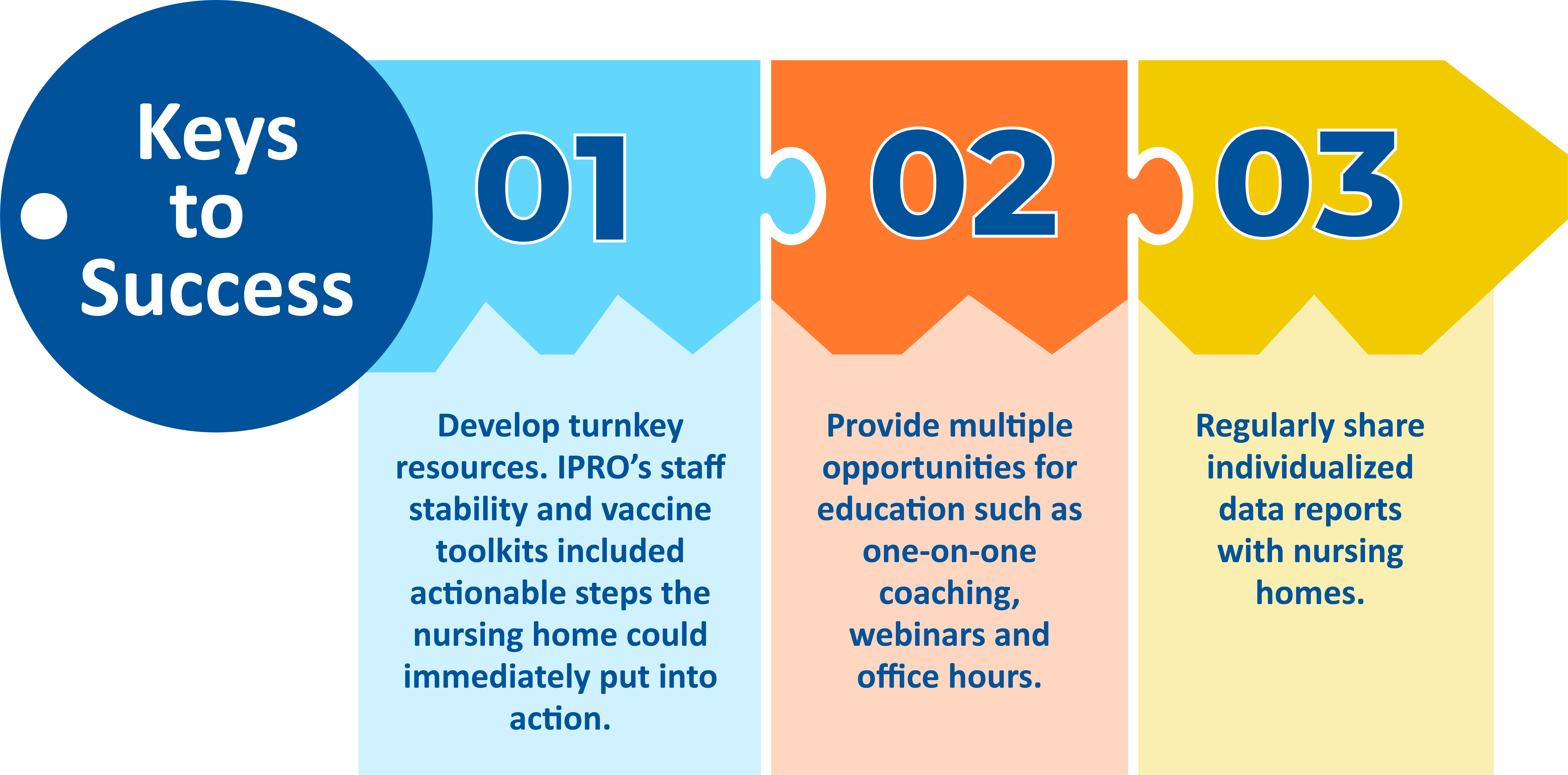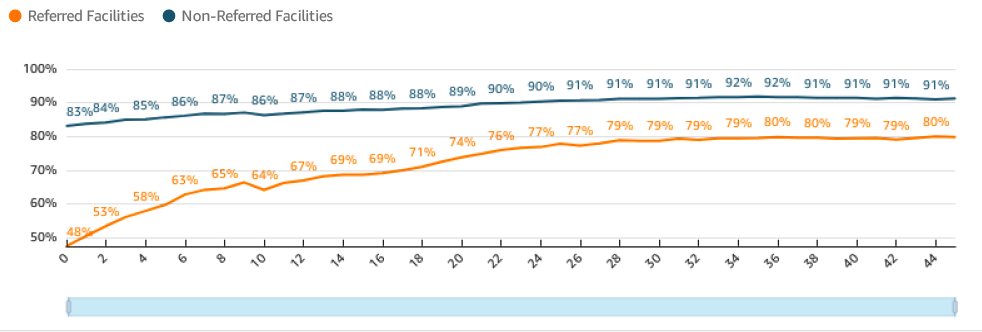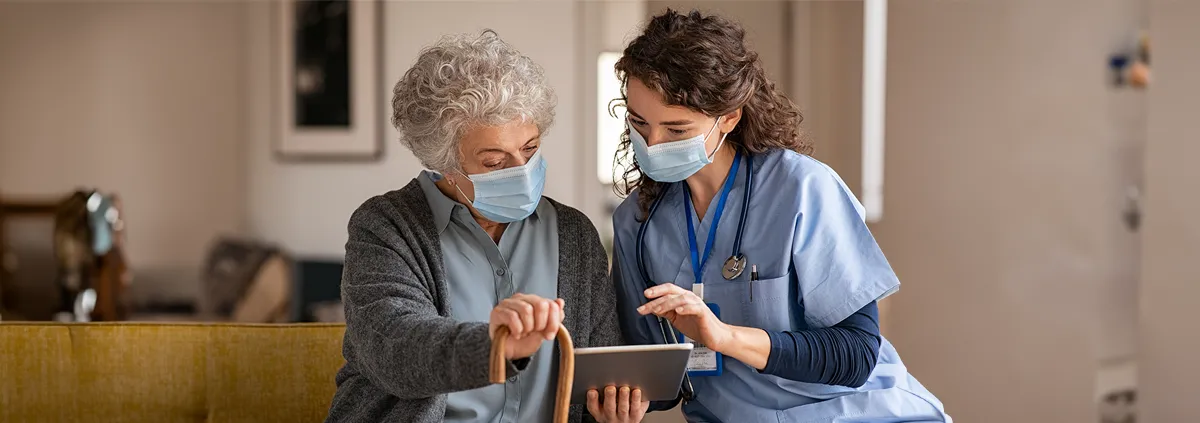A New England nursing home known for embracing its “outdoorsy” residents by involving them in activities that allow them to enjoy the rural area in which they live was referred by the Centers for Medicare & Medicaid Services (CMS) to IPRO, a CMS Quality Innovation Network-Quality Improvement Organization (QIN-QIO), for assistance with improving its resident COVID-19 booster rate. With IPRO’s help, the facility increased its rate by 75.5 percent from when it was first referred to the QIN-QIO and the last report to the National Healthcare Safety Network (NHSN) database in October 2022.
During its initial conversations with the nursing home, IPRO learned that the facility’s biggest challenge was staff stability. Pop-up temporary staffing agencies in the area exacerbated this challenge making it difficult for the nursing home to retain staff. To help the facility stabilize its workforce, IPRO provided a staff stability toolkit. The toolkit highlights the five management practices associated with high retention, attendance and performance and the core competencies needed to support these practices.
IPRO also focused its assistance on providing education to ensure new staff, including the nursing home’s new Director of Nursing (DON), had the latest information about infection prevention and COVID-19 vaccination and boosters. In addition to one-on-one coaching with the DON, IPRO provided two toolkits for frontline staff which they described as “nurse-friendly” and self-explanatory. The Influenza, Pneumococcal and COVID-19 Immunization Toolkit includes all the elements a nursing home needs to develop a vaccination program including conducting a root-cause analysis, staff education and developing and maintaining immunization logs. The Friends and Family Vaccine Clinic Toolkit includes tools and resources to help nursing homes partner with their local community to host a vaccination clinic. By implementing the best practices highlighted in this toolkit, the facility was able to regularly offer booster clinics.
In addition, the nursing home made staff boosters a priority, particularly for staff who are 55 plus, as the facility has a large resident population in this age group. These staff, particularly those who are closer to 55 and who are more tech savvy and “Google-friendly,” were more vaccine hesitant. Ensuring staff who fall in this age range were vaccinated and well-educated about the booster was key to helping them address any concerns or hesitation from their resident peers.
Beyond the targeted assistance the QIN-QIO provided, the facility also participated in IPRO’s 13-week Booster Blitz educational campaign which included 30-minute weekly webinars and office hours sessions called IP3 – Infection Prevention by an Infection Preventionist for Infection Preventionists. Both the webinars and the IP3 sessions were intended to connect facilities and provide opportunities to hear examples of successful interventions for preventing the spread of infection and increasing resident COVID-19 booster rates. On average, 230 people participated in the webinars and 82 participated in the IP3 sessions.
To further support the nursing home’s success, IPRO provided the facility with quarterly Standard Analytic Reports (SAR). The SARs summarize the nursing home’s current Quality Measure score and compares the facility’s performance to the national distribution for each measure. The report also includes graphics to give the nursing home an at-a-glance view of its trends and identifies potential opportunities for improvement.
Keys to Success
IPRO’s success helping the nursing home increase its COVID-19 booster rate by nearly 76 percent can be attributed to the staff-friendly tools and education it provided and that the facility consistently used. This success can be replicated by taking the following steps:

All nursing homes in the region served by IPRO that were referred to the QIN-QIO for assistance between January 9 and October 2, 2022, saw a 21 percent net increase in resident vaccination/booster rates as compared to nursing homes in the state that were not referred to the QIN-QIO for assistance. In addition, the percentage of fully vaccinated and boosted residents in nursing homes in the state that were referred to the QIN-QIO for assistance, increased by 32 percent, compared to fully vaccinated and boosted residents in nursing homes not referred to the QIN-QIO, which increased by only eight percent.
IPRO QIN-QIO’s Regional Nursing Home Resident COVID-19 Vaccination/Booster Rates Including Referrals from January 9 through October 2, 2022.
The graph compares vaccination rates of CMS-referred facilities (orange) with never-referred facilities (blue) and only includes referrals made between January 9 and October 2, 2022. Never-referred facilities did not meet initial criteria for booster referral because CMS focused on facilities with significantly lower rates.

This material was prepared by The Bizzell Group (Bizzell), the Data Validation and Administrative (DVA) contractor, under contract with the Centers for Medicare & Medicaid Services (CMS), an agency of the U.S. Department of Health and Human Services (HHS). Views expressed in this material do not necessarily reflect the official views or policy of CMS or HHS, and any reference to a specific product or entity herein does not constitute endorsement of that product or entity by CMS or HHS. 12SOW/Bizzell/DVA-1145-07/18/2023

